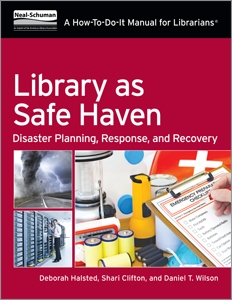
Primary tabs
You don't need to be an ALA Member to purchase from the ALA Store, but you'll be asked to create an online account/profile during the checkout to proceed. This Web Account is for both Members and non-Members.
If you are Tax-Exempt, please verify that your account is currently set up as exempt before placing your order, as our new fulfillment center will need current documentation. Learn how to verify here.
- Description
- Table of Contents
- About the authors
- Reviews
Libraries have always played a special role in times of disaster by continuing to provide crucial information and services. The Stafford Act of 2011, a federal government directive, designates libraries as among the temporary facilities delivering essential services, making a Continuity of Operations Plan imperative for libraries. Peppered with informative first-person narratives from librarians recounting emergency situations, Halsted, Clifton, and Wilson cover such topics as:
- An eight-step approach to developing a risk assessment plan
- How to draft a one-page service continuity plan
- Information on how to use mobile devices and social media effectively in times of disaster
- Sample disaster plans, along with model exercises, manuals and customizable communications
Published in cooperation with the Medical Library Association (MLA), this nuts-and-bolts resource will enable libraries of all kinds to do their best while planning for the worst.
Contents
List of Illustrations Preface
Chapter 1. Risk Assessment and Continuity of Operations Plans Chapter 2. Responding to a Threat Chapter 3. From Self-Reliance to Asking for Help Chapter 4. A One-Page Service Continuity Plan Chapter 5. Tapping the Potential of Mobile Technologies and Social Media for Preparedness and Response Chapter 6. Personal Preparedness and Possible Impact on Library Services Chapter 7. Leveraging the Library Chapter 8. Two Model Scenarios for Cooperative Engagement
Appendix: Resources About the Authors Index
Deborah Halsted
Deborah D. Halsted has over 30 years of professional library experience, primarily in academic medical libraries. It was after severe flooding in the Texas Medical Center Library in Houston caused by Tropical Storm Allison in 2001 that she became involved in disaster planning and recovery. In 2005 she coauthored Disaster Planning: A How-To-Do-It Manual for Librarians based on her personal experiences. She has remained active in disaster planning, especially in extensive training in the National Incident Management System Incident Command System, which is vital to any incident, large or small. She received her master's degree in library science from Florida State University.
Shari Clifton
Shari C. Clifton has been a health science librarian for more than 20 years and is currently Professor/Head of Reference and Instructional Services at the University of Oklahoma Health Sciences Center's Robert M. Bird Library in Oklahoma City, Oklahoma. An active participant in professional organizations at the state, regional, and national levels, Clifton has held a variety of elected/appointed positions and has presented numerous papers, posters, and programs at professional meetings. She is a distinguished member of the Medical Library Association's Academy of Health Information Professionals. For many years, Clifton has served as the coordinator of outreach activities for the Bird Library, and she has been actively involved in preparedness activities in Oklahoma and her region. In addition, she directed mediated search services and support for individuals working on systematic reviews and other comprehensive projects. Clifton earned her master's degree in library and information science from the University of Oklahoma in Norman, Oklahoma.
Daniel Wilson
Daniel T. Wilson is the associate director for Collections and Library Services at the University of Virginia Claude Moore Health Sciences Library. Since the summer of 2007, he has served as the coordinator for the National Network of Libraries of Medicine (NN/LM) National Emergency Preparedness and Response Initiative. In that role, Dan coordinates the emergency preparedness and response activates of the network and regularly facilitates workshops designed to bring together emergency planners and the library community to discuss roles and plan partnerships. He has coauthored articles about libraries and emergency planning with his colleague Susan Yowell. Dan earned his master's degree in library science at the State University of New York at Geneseo.
"Should be required reading for all librarians who want to better prepare staff for the most dire of circumstances."
— Booklist
"Halsted, Clifton, and Wilson demonstrate their extensive research and valued expertise concerning disaster planning, response, and recovery through clear writing, relevant examples, and well-constructed text features. In addition to providing step-by-step instructions for constructing and carrying out disaster relief efforts, firsthand accounts of emergencies are scattered throughout the text and provide real-life insight into specific situations."
— VOYA
"Clearly explains the essential disaster preparation concepts and how to translate these concepts into actions. The first-person experiences that are interspersed throughout are valuable for understanding how actual situations were handled and, more importantly, what worked and what did not work. The three authors bring over six decades of collective experience in disaster planning and preparation to the topic. It is this experience that adds to the quality of the information and guidance provided."
— Technical Services Quarterly
"Well-organized and easy to use ... should be a staple in every library system."
— Catholic Library World
"Well thought out and clearly written ... without a doubt this publication is a significant contribution to the topic of libraries and disaster preparedness."
— The Library Quarterly


